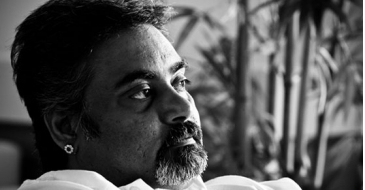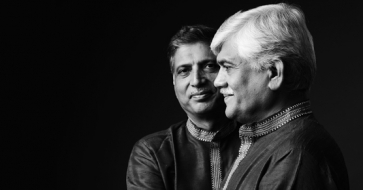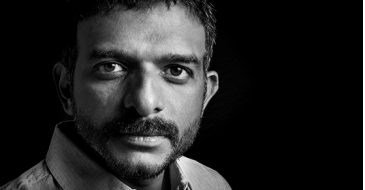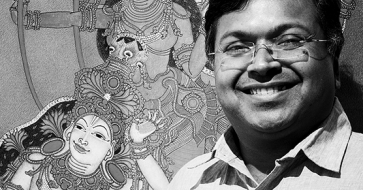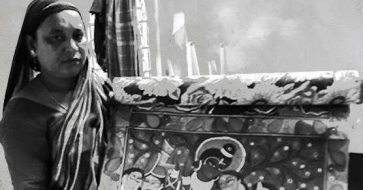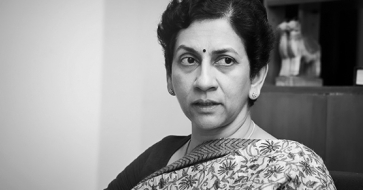Arundhathi, I want to start by talking about the concept of 'Home'. You write on home in your eponymous poem:
'Give me a home, that isn't mine,
where I can slip in and out of rooms without a trace'...
And then, the poem ends by saying
'A home, like this body, so alien when I try to belong,
so hospitable when I decide I'm just visiting.'
'Home' has been a recurring motif in your work. Tell me, as a poet, what is 'Home' for you, not in a geographical or physical sense but in a way which is metaphorical and speaks of an inner belonging.
Let me start by speaking of 'home' geographically. There's a poem of mine called 'Where I Live' which talks about Bombay, and I often preface that by saying that it explores the gap between where I live and where I belong. I was never quite sure where I belonged but I knew where I lived. Today the situation is somewhat reversed!
Both 'Where I Live' and 'Home' were written at the same time -- around 2003. And I often think of 'Home' as an oddly prescient poem. It intuited what was later to become part of a personal worldview, a way of life, as it were. At the time, Bombay, the city I inherited and kept seeking to reinvent for myself, was beginning to seem inadequate. Gradually, this relationship of 'exasperated intimacy' with the city, and indeed, with my cultural and spiritual context, grew increasingly fraught. And in 2010 when I moved to an ashram in Coimbatore, it was in fact an attempt to deepen and reinvigorate my understanding of belonging. Without repudiating one home and validating the other, I wanted to deepen my journey, my quest for anchorage.
The ashram helped, and it continues to be a very important place personally. But it also helped me realize that I didn't need to have one single home, that belonging would never be singular or unitary -- and that a certain condition of mendicancy or vagabondage was not an unpleasant or unwelcome thing.
So, if you were to ask me 'where I am based', I've realized that isn't just the ashram, it isn't just Bombay, it isn't just one set of friends, one circle of litterateurs, one band of seekers. I actually belong, as I suspect many of us do, in a much more complex way.
Let me take you to a related poem. Between 2010 and 2013, I wrote a string of 8 poems on the mythic figure, Shakuntala. It was when I completed that poem cycle that some things became clear for me. The poem began to germinate as far back as 2003. I was lying in a hotel room in Guwahati, and suddenly the story of Shakuntala seized me with these great, racking sobs. I had no idea why. I had never realized that myth could operate on such subtle levels -- that a long-familiar story could suddenly trip one up in the most unexpected way. The scene that came to my mind at that point was from Kalidasa's play: Shakuntala taking leave of the forest before going to the court, where she hopes to be reunited with her lover, Dushyanta. As readers, we, of course, know that union is not going to happen. It is an exquisitely poignant scene where Shakuntala is filled with mixed feelings – loss, fear, hope, anticipation. For some reason, just recalling that scene quite undid me.
In 2010, seven years later, when this scene from Shakuntala just refused to go away, I began work on the poems. My starting point was simple: this woman seemed doomed to unbelong! If Shakuntala had continued being in the forest, I suspect she would have yearned to be in court with Dushyanta. But if for some reason she had been embraced by him, she would have yearned to be back in the forest with her wise, old sage, Kanva Maharishi, her friends, the deer, the trees, the creepers. I then figured that if Shakuntala is the daughter of an Apsara and a Rishi, she was genetically confused! She was programmed by her mongrel parentage to belong neither to the heavens nor to this world. I thought of her as this walking catastrophe, incapable of finding her home, trying to make sense of a fragmented, piecemeal inheritance.
And then, something else began to unfold – not intellectually, but in the act of writing itself. It became increasingly apparent to me that Shakuntala embodied a fundamentally human predicament: the sense we all have of never quite being where we are meant to be. So, the poems explore this perverse nature of human belonging wherein we always believe home is elsewhere. And on that level, Shakuntala enacts a story from innocence to experience that is retraced in so many myths of the world.
A spiritual journey doesn't lead you to certainty. In fact, a spiritual journey is not a journey from uncertainty to certainty. It is a movement from viewing uncertainty as terror to viewing it as potential freedom. It's about making your peace with uncertainty. Or finding ways to live with it
As I began to write, Shakuntala became for me the archetypal female questor. I saw her no longer as heir to a fragmented legacy, split between 'nature' and 'culture', 'spirit' and 'flesh', 'here' and 'hereafter', 'palace' and 'forest', all the old binaries. Instead, I saw her as someone capable of inhabiting more than one world. This condition of 'multiple citizenship' can be a great source of strength, a tremendous vantage point. Many of us don't realize it. But we are actually terribly fortunate to have access to multiple addresses – multiple languages, multiple worldviews, multiple ways of belonging.
I would say today that that for me is 'home' – that complex address that combines anchorage and adventure. Not a single place. Perhaps in some nostalgic mode, we might imagine a place of innocence for ourselves – a Garden of Eden, a pre-lapsarian state. But the seeker realizes that she is all the richer for the complex, contrary, challenging experiences she has had. She doesn't want simple 'either/or' choices. She wants 'this' and 'that', not 'this' or 'that'. It's no longer a choice between samsara and nirvana. Instead, she wants both, and she sees that she is the bridge between the two. She is the link, the spine that connects disparate worlds: that's how important she is!

And yet as one journeys, and grows older, quite contrary to popular perception and in fact, quite alarmingly, one finds that sometimes one grows less certain about things and issues that may have appeared fairly certain and obvious at one time. Our views are no longer as definitive as they may have once been. And that can be an unnerving feeling. So, have you encountered, whilst making this creative journey of yours, this ambivalence, this self-doubt even? And, has this feeling of unsettlement found its way into your writing, and in turn, has your writing strengthened this feeling or provided you the anchorage one needs to negotiate life?
There is this poem of yours 'Transplant' which perhaps makes a slant reference to this -
"Show me a plant that's not in search of a pot...
that knows whether its meant for orchard, rainforest or jam-jar.."
and then ends by saying
"you'd think it gets clearer with time. It doesn't".
Good question. Yes, the poem starts by resolving to see ambivalence as a strength. But you're right: ambivalence is unnerving. And the doubts never settle. One hopes that the feeling of being out of place, of being a perennial 'transplant', will abate with time. It doesn't. So, you end up feeling, as the poem says, like a crocus with a raging heart of Himalayan pine. Or a banyan wishing it could be bonsai. I think we've all known that feeling, haven't we? Not being in our own soil – whatever that is. Perhaps it doesn't even exist!
The ambivalence doesn't go away, Ashwin, but the perspective shifts. A spiritual journey doesn't lead you to certainty. In fact, a spiritual journey is not a journey from uncertainty to certainty. It is a movement from viewing uncertainty as terror to viewing it as potential freedom. It's about making your peace with uncertainty. Or finding ways to live with it. So, I think what's changed in my poems is tone. The poems seem less fraught, less oppressed by not belonging. My tone I think has become more capable of celebrating this ambivalence.
Sadhguru, my spiritual guide once, very early on, made a distinction for me, between 'clarity' and 'certainty'. He said that 'certainty' is often the resort of the fanatic. Clarity, on the other hand, is a matter of perception. I see what he means. A spiritual practice offers you a way to look at something without necessarily drawing conclusions about it. So, I think the need to live by rigid opinions and judgements has abated in my life. I enjoy uncertainty a little more than I did before. Writing for me has always been a way to map where I am at. I have always said that 'Poetry is the shortest and most direct route to myself' and in that process of mapping you also figure out where you are at. But while you can figure out your location, it will never be a fixed location, a permanent address. That keeps changing -- hopefully deepening.
Poetry is the shortest and most direct route to myself
It seems to me that poetry is ultimately 'personal' and 'autobiographical'. It is a very private form of expression at one level. And yet, this circle of intimate expression eventually intersects with the circle of public readership. And then, the reader begins to identify with, to relate to and perhaps even makes the poet's writing her own. So, there's something about the power of words, especially in verse form, that when you write them, they appear to be assuredly of the province of you, they seem to belong to you and to you alone, in one sense. And yet, when it meets readership, the poet cedes any claim to sole ownership of that. So, really, my question is how does it feel when as poet you write something that stems from the deepest recesses of your existence and which at first utterance seems to belong and make sense only to you and yet when your readers read it, they see something familiar, something recognizable in it.
I think the word that is very important to me is 'intimacy'. The idea of poetry as whisper – as an utterance that can record the dampness, the heat of a deeply intimate moment – excites me. The reader is being invited into that space, where that creative churning is happening. That gives it immediacy, an edge, an intimacy, life. So, as a reader, if you feel that you are being drawn closer towards that heat, then you know you are in the presence of poetry.
At the same time, I don't see a poem as a page from my personal diary. While a poem is an invitation into inner life – or an intersection between the inner life of poet and reader -- it is not biography. I would make the distinction between the personal and the private here. When I am putting a poem out there, I am not inviting the reader into a private space. But I am certainly inviting the reader to hear a very personal utterance. I am inviting the reader to a chosen intimacy, hoping we can find a place where our subjectivities overlap.
Every writer will tell you that as one writes, memory fictionalizes, and editing takes place. Even as you disclose, you compose. Poems are, in fact, about 'lying truthfully'. Writing poetry is an act of 'self-revelation' and 'self-construction' at the same time.
So, a reader needs to be cautious about not turning literal in the way she or he reads poetry. I say this because the word 'confessional' is bandied about a great deal in the sphere of women's literature. And I want to stress that the women poets -- the ones I admire at least – aren't confessional in any jingoistic sense of the term. They're inspired image-makers, capable of combining honesty with a high alertness to form.
What has it meant to find your spiritual sanctuary and how has it fed its way into your writing, if it does?
As I see it, it has probably fed less into the 'what' and more into the 'how'. I think it has fed into the way I lead my life, how I talk, how I think and hopefully how I do everything in my life, rather than 'what' I do. I think finding a little more inner clarity has made my poems breathe differently. There are more gaps in the text than before. There is less of an anxiety to be understood, less of an anxiety to explain. There is a greater ability to trust where a poem wants to go, and to trust that it will be understood. There is, as I write, a willingness to be led by the poem -- to be startled by it too.
Some readers ask if this means I'm now about 'spiritual subjects'. I don't know what that means, really. Even my poem, 'How Some Hindus Find Their Personal Gods', is essentially a love poem. It's about the discovery of a personal god – an inspiration, an ally, a companion, you can love, quarrel with, even ultimately dispense with. One can have many little loves, but the 'ishta devata' is that one big love of one's life -- and what's more, he or she recognizes you as well. It's a deeply mutual relationship.
And that for me is what is marvelous about the Bhakti tradition of poetry. I assumed at one point that my spiritual journey would move from the emotional to the cerebral – from a more rudimentary touchy-feely saguna spirituality to a more soberly contemplative abstract spirituality. Now I realize how naïve I was to assume that. A spiritual journey that makes sense to me today is one that implicates body and heart, not just the mind.

So, I love the concept of the 'ishta devata' -- the idea of a god you want to know everything about, from her or his name, address, food preferences, allergies! This crazy all-consuming curiosity about the other is tremendously important ultimately as a device to know oneself. And I wanted that tenderness, that affection to spill into my poem, which makes it essentially a love poem. So, no, I'm not writing about spiritual subjects. But I would like to think that an unfolding spiritual journey has possibly made me a better love poet than before.
How important is it for a poet to find a sense of comradeship in another poet? The satisfaction that there exist others who are purveyors of the same craft. Wouldn't poetry be a fairly lonely enterprise otherwise? How vital is a companionship, a 'gharana' of sorts for a creative pursuit to persevere?
I personally think I have benefited a great deal by growing up in Bombay. I didn't realize it then but I realize now that I was incredibly lucky to have grown up in a city of poets – from Arun Kolatkar, Nissim Ezekiel and Adil Jussawalla to Gieve Patel, Dom Moraes and Eunice de Souza. I mean, there were poets everywhere! I wasn't quite aware of it then, but the fact that one was in a context that was not necessarily unfriendly to poetry meant a great deal. At the same time, when one is young, one does feel like a solitarist, asking questions which no one has asked before, though really, everyone has!
In any case, it was wonderful to be part of the Poetry Circle in my formative years – a forum to which several city poets gravitated every fortnight. Nissim Ezekiel offered us his PEN headquarters on New Marine Lines in the 1990s, and many of the memorable Poetry Circle meetings happened there. It was a place where one could "talk poetry" for hours and not feel like a bit of nut or an outcast. We weren't just discussing how to get published. We read poetry from across the world that excited us and tried really hard to put our finger on what made it work. I don't know about a 'gharana', but there was certainly a great sense of camaraderie and community there.
Today, I would say, certainly there are some poets with whose work I feel a sense of kinship. But merely being a poet doesn't make a person part of one's tribe. There are other factors at work. I feel at times a sense of kinship with practitioners of other forms. My conversations with the classical dancer, Alarmel Valli, for instance, are important to me. Or with my Italian translator, Andrea Sirotti. Or with my younger dancer friend, Sanjukta Wagh. So, in that sense, a need for that kind of an exclusive poet's circle may have evaporated, but I would say that in some ways the Poetry Circle has never left me, because it was also the basis for some very important friendships in my life. Jerry Pinto, Ranjit Hoskote, Gayatri Majumdar, Prabhanjan Mishra, TR Joy, Shabnam Jhuremalani, Menka Shivdasanai, Abhay Sardesai, Derek Antao – all their voices, to greater and lesser degrees, are a part of a personal inheritance that I value greatly.
Writing poetry is an act of 'self-revelation' and 'self-construction' at the same time
I want to end by drawing attention to something you have said earlier. For me, it was a very powerful and compelling argument for the contagion of poetry. You use this phrase 'Poetry being the most direct verbal route to the self'. I don't think there can be a better articulated idea. So, my question is not if poetry is still relevant, but if it is wrong to ask that more people can find this most direct, verbal route to the self. Not as a writer, but as a reader.
It always amazes me that each one of us has, at some point, written a poem, though not each one of us has written a novel or an essay. And yet, so many of us are afraid of reading poetry! Think about it. By the age of 16, each one of us has written at least one poem. So, there is something in us that recognizes instinctively that this is the form to turn to when you want to express something high-voltage. No one needed to tell us, 'Oh, you are in love, so you should now write a love poem.' We simply did it. We knew that moments of intensity demanded verse, not prose.
So, what exactly happens after that? I'm convinced it must have something to do with the way poetry is taught. As students, we're often made to feel we must decode a poem, not read it. We start approaching each poem as a puzzle to be cracked. And I'm not a puzzle person anyway, so, if I had to start approaching every poem as a riddle, I'd go nuts and give up poetry. Instead, we need to be encouraged to simply look at a poem – gaze at it, be with it, savour it, hang around it. The most seemingly dense metaphors begin to unfold their deeper mysteries with the simple act of attention. No one tells us that.
You know, Joseph Campbell says this in one of his interviews, and I realize how right he is. He says what we're seeking is not the meaning of life, but a more intense and profound experience of life itself. And that certainly holds true for my own journey, as seeker and poet. I wanted to be a participant and celebrant in life's deeper mysteries, not a detached observer who stands apart and decodes it.
When I used to curate dance at the NCPA in Bombay, I found uninitiated audiences could be transfixed, for instance, by their first-time viewing of Kudiyattam. This was not because they understood the grammar of the form, but because they saw a performer of calibre do something with a great deal of intensity, focus, conviction and presence. Just watching that can heighten our experience of life. Similarly, I read poetry not for the meaning of a poem alone. I turn to poetry for the experience that I spoke of earlier -- the heat, the power, of life itself. When artistry and authenticity come together, you are in a place of heightened aliveness. What more can you want? That's all that a reader of poetry needs to ask herself or himself: not 'do I understand it' but 'do I feel invited to a place of honesty, of beauty and aliveness'? If you are, then you are in the presence of poetry and you are a 'rasika' -- and that's all that matters. Sit back and enjoy the feast.
Interviewed by Ashwin Prabhu
0 comments Comments





